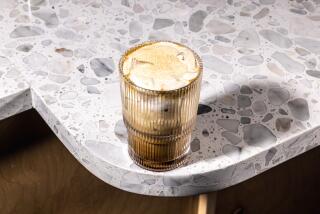Gourmet Coffee Sales Perking Up : Food: As popularity booms, the industry worries that inferior beans are sometimes passed off as exotic blends.
Any coffee brew just won’t do for Jim Reynolds.
Fill his cup with freshly ground Guatemala Antigua, a full-flavored coffee made of choice arabica beans grown at altitudes of 5,000 feet and above. “It has a high degree of acidity, a spicy character and chocolaty overtones.”
Spoken like a coffee connoisseur and the general manager of Peet’s, a San Francisco Bay Area chain of gourmet coffee shops, where a pound of Hawaiian-grown Kona coffee sells for $10.95.
As have many in his specialized industry, Reynolds has profited handsomely from consumers’ growing taste for pricey gourmet coffee. But the fast-paced growth has met with mixed feelings in the gourmet coffee set, who worry about inferior beans being passed off as exotic blends and by the entry of mass-market roasters.
“The problem with the tremendous growth is that you have a lot of marginal people who are coming in,” said Larry Emerine, owner of Euro Coffee, a Los Angeles gourmet coffee roaster and retailer. “There is a lot of coffee being sold as gourmet that is not gourmet.”
For those who buy coffee that’s on sale, such concerns might seem like a tempest in a coffeepot. But purveyors of high quality coffee fear that they will lose business if consumers pay hefty prices for lower grade coffee disguised as gourmet.
“Our concern as specialty coffee makers is that there will always be people who try to make a gimmick or a mockery of the program,” said Steve Schulman, founder of Hillside Coffee, which distributes whole bean coffees.
Worries about bogus gourmet coffee have not hurt sales. Sales have grown at about 25% annually and gourmet coffees now claim about 10% of the estimated $6 billion in yearly coffee sales, according to FIND/SVP, a New York-based marketing research firm. Meanwhile, overall coffee sales have remained virtually flat.
Gourmet coffee has won over many converts.
Karyen Sanders, 41, of Pasadena cannot remember the last time she purchased a national brand. “It just seems fresher tasting, and I like grinding my own beans,” said Sanders, who purchased two 1-pound bags of Hillside’s house blend for more than $5 each--about $2 more than the major brands.
“This growth demonstrates consumers are willing to pay more to get a better cup of coffee,” said Steven Gregg, director of marketing services for the Coffee Development Group of Washington, a trade group.
In the supermarket aisles, the coffee giants, often derided for bland tasting products, have gone gourmet. This month, Procter & Gamble rolled out its Folgers Gourmet Supreme, and General Foods USA recently introduced a whole bean version of Yuban. Even supermarkets are getting into the act: Vons is stocking its own gourmet Royal Request brand.
Some companies are marketing so-called “premium coffees.” Maxwell House, also owned by General Foods, has introduced two “premium” varieties called Rich French Roast and Colombian Supreme, made from a combination of pricey beans.
But General Foods stops short of calling the two coffee varieties gourmet. “They are not gourmet coffee,” said company spokesman Ken Defrens.
Most coffee experts agree that gourmet coffee must contain arabica beans, prized for their flavor. In contrast, most coffee is made with robusta beans, which are less tasty than arabicas but more hardy and less expensive.
But there are different varieties of arabica, and they are often blended with robusta. Complicating matters is a lack of government or industry standards defining gourmet coffee.
And there are instances of outright dishonesty. Emerine recalls a company trying to pass off dark-roasted, low-grade beans as choice arabicas. “Once it’s roasted, it’s brown and who knows” the difference, he recalls the roaster saying.
“There is a potential for abuses of the term ‘gourmet’ and the premiums that are paid for it,” said Gregg at the Coffee Development Group.
Gourmet coffee makers are also skeptical whether the giant coffee roasters are geared to produce and distribute high-quality gourmet products on a national basis. The specialty coffee makers point out that Maxwell House introduced a line of whole-bean coffees, Private Collection, a few years ago that has failed to win over many consumers.
While Private Collection is not distributed nationally and receives little promotion, Defrens at Maxwell House said the brand is not a flop. “It’s a relatively small business, but it’s a vibrant business.”
And the big roasters defend their ability to produce gourmet brews. “We feel confident that we can produce a gourmet coffee product that consumers can enjoy can-after-can regardless of our size,” said Procter & Gamble spokeswoman Wendy Jacques.
Despite their disdain for the national brands, gourmet coffee makers don’t expect to win everybody over to their side.
“There are people who wander into our stores and wonder what all the fuss is about,” said Reynolds. “Then they go back to what they were drinking.”
More to Read
Eat your way across L.A.
Get our weekly Tasting Notes newsletter for reviews, news and more.
You may occasionally receive promotional content from the Los Angeles Times.







